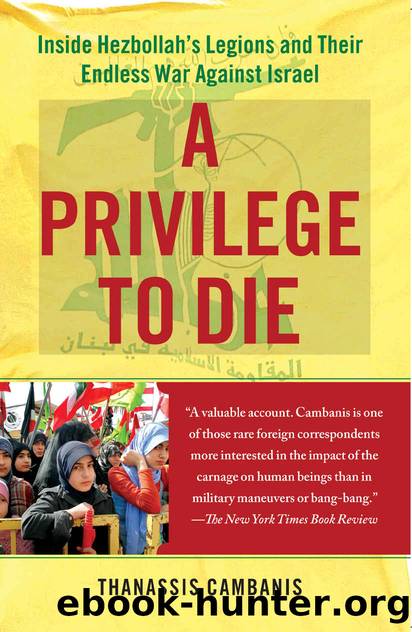A Privilege to Die: Inside Hezbollah's Legions and Their Endless War Against Israel by Thanassis Cambanis

Author:Thanassis Cambanis [Cambanis, Thanassis]
Language: eng
Format: azw3
Publisher: Free Press
Published: 2010-09-27T16:00:00+00:00
We called Farah and she invited us to visit her a few days later, on Monday evening before the iftar. She gave us detailed directions to the apartment so we wouldn’t have to ask around and call attention to ourselves. Hwaida got the impression that Farah was meeting us over the objections of Hezbollah. We rang her doorbell shortly before sunset. Farah came to the door after we’d rung three times; she appeared to have woken from a deep sleep. She motioned us to follow her into the living room. She welcomed me in English, which she understood well, although she preferred to speak Arabic. The apartment appeared newly furnished; the family had only moved there in September, when Farah decided to relocate the family to Beirut from Bint Jbail. Her sons rode tricycles back and forth on the enclosed porch.
In the living room hung photographs of Rani, Nasrallah, and Khomeini. In anticipation of my visit, she had arranged two special photographs of Rani on the coffee table. In one picture, Nasrallah was handing Rani a commendation. Both men were smiling at the camera and looked young. Rani was skinny, in full battle-dress uniform, a black beret on his head, with a very narrow beard and mustache. The picture appeared to date from the mid-to-late 1990s. The second picture showed an elated Rani pumping his right fist in the air in front of the podium where Nasrallah was speaking in May 2000, the day after Rani and the other detainees were sprung from Khiam Prison. Rani was wearing a heavy plaid shirt, a black vest, and a red headband. A trace of stubble shaded his head and face, and his eyes were closed. He appeared utterly transported.
Farah was passionately devoted to Hezbollah’s cause. She was also in love with her husband, and missed him tremendously. I think she wanted to meet me because she wanted to gather extra memories from the final month during which she hadn’t laid eyes on him, and because she was curious to learn what impact her beloved had made on a presumably hostile foreign journalist. Rani’s friends and family were convinced that Rani’s magnetic appeal would have magically opened my eyes to the righteousness of Hezbollah. For me Rani humanized a worldview that until I met him felt robotic, monolithic, inhumane; I wanted to learn more about him, and the popular movement he espoused and embodied. Hezbollah’s followers often confused my empathy and curiosity for something else. Many of the Hezbollah adherents I met, like Umm Abbas and her son Ayman, mistook my inquiry into Hezbollah for a fellow-traveling sympathy for the party’s ideology and aims. They hoped I had fallen under a benign spell. Farah, I felt, expected less from me. She didn’t try to make me profess anything or explain myself. She asked me concrete questions about my encounter with her husband; she wanted details and pictures, and seemed to take comfort in the opportunity to talk at length about their story.
Her sons entered and greeted me dutifully, kissing me on the cheeks.
Download
This site does not store any files on its server. We only index and link to content provided by other sites. Please contact the content providers to delete copyright contents if any and email us, we'll remove relevant links or contents immediately.
| Arms Control | Diplomacy |
| Security | Trades & Tariffs |
| Treaties | African |
| Asian | Australian & Oceanian |
| Canadian | Caribbean & Latin American |
| European | Middle Eastern |
| Russian & Former Soviet Union |
The Secret History by Donna Tartt(16610)
The Social Justice Warrior Handbook by Lisa De Pasquale(11485)
Thirteen Reasons Why by Jay Asher(7782)
This Is How You Lose Her by Junot Diaz(5753)
Weapons of Math Destruction by Cathy O'Neil(5030)
Zero to One by Peter Thiel(4817)
The Myth of the Strong Leader by Archie Brown(4785)
Promise Me, Dad by Joe Biden(4440)
Stone's Rules by Roger Stone(4412)
Beartown by Fredrik Backman(4404)
How Democracies Die by Steven Levitsky & Daniel Ziblatt(4392)
The Fire Next Time by James Baldwin(4337)
100 Deadly Skills by Clint Emerson(4071)
A Higher Loyalty: Truth, Lies, and Leadership by James Comey(4025)
Rise and Kill First by Ronen Bergman(4008)
The David Icke Guide to the Global Conspiracy (and how to end it) by David Icke(3875)
The Farm by Tom Rob Smith(3869)
Secrecy World by Jake Bernstein(3773)
The Doomsday Machine by Daniel Ellsberg(3725)
